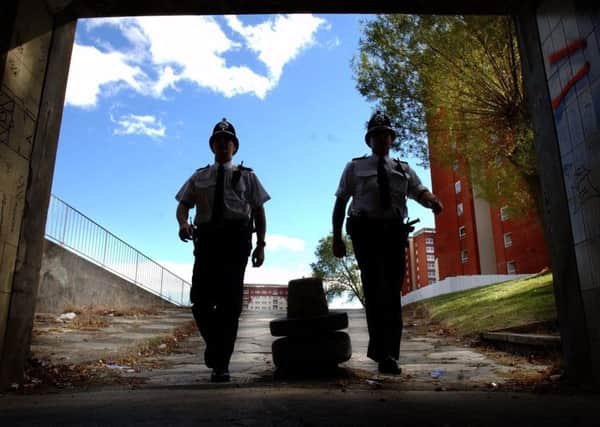Hilary Barber: A clergyman’s night on front line brings home cuts threat to police


This question has been gnawing away at me for some time now. Halifax Minster, like many places, has experienced a persistent low level of anti-social behaviour for some time.
This does not need a 999 response, but a 101 call for advice to deal with the matter. It was this point that brought me into contact with the Calderdale divisional commander and, after expressing a desire to learn more about local policing, I found myself out with Team 5 on one of the busiest nights in the calendar for the emergency services – Bonfire Night.
Advertisement
Hide AdAdvertisement
Hide AdPolicing in the 21st century is a sophisticated juggling act; it has to meet the challenges of crime and disorder in this climate of austerity with a very public face.
As I joined Team 5 for the 9pm-7am shift, I found myself, in bullet-proof vest, sitting amongst a professional team of men and women of different ages and ethnicity.
Amidst Taser guns and tear gas canisters, we were briefed by the duty inspector who gave us an overview of potential trouble-spots, stressed the importance of border cover on the edge of the borough and of supporting police community support officers and special constables.
I was to spend the night covering the Halifax area; population 100,000. It’s important to say from the outset that Calderdale is one of the safest places in the country. And, like many areas, it finds it is the same small percentage of the population who take up most police time and resources. That same small percentage can be found amongst the most vulnerable people in our society, those who make their living on the streets, those on the margins of society, those who suffer from mental health issues, and those with addictions to alcohol and/or drugs.
Advertisement
Hide AdAdvertisement
Hide AdIn my 10 hour shift, I was to experience a road traffic collision; an arrest for breaking bail; two appalling examples of domestic violence; a drunken fight in a nightclub where the police had to take one of the party to hospital because he would have been deemed low priority by the ambulance service on such a busy night; transporting a prisoner to Barnsley – 25 miles away – because it had the only bed available locally for a mentally ill prisoner; and receiving a computer from a 13-year-old who had been communicating with unknown men over the internet.
That’s before I count being spat at, verbally abused, vomited over by inebriated young men, pulling over two speeding vehicles and time spent in the custody suite observing how prisoners are received and booked in with support from specialist mental health practitioners and NHS nurses.
In those busy 10 hours, I was proud to walk alongside that group of highly trained committed professional men and women out there serving their community. I managed a 20 minute break in that time, and I saw officers bringing in their own food as there was no hot meal available through the night.
Since the Spending Review of 2010, West Yorkshire Police has lost about 1,000 officers, nearly all the civilian posts have gone, and the latest spending review threatens to remove most of the police community support officers too.
Advertisement
Hide AdAdvertisement
Hide AdThe Government has yet another austerity budget review next week and the Home Office budget remains unprotected. Many areas of the NHS and the Prison Service have already been sold off to the private sector, will the police go next? Will the profits of shareholders be more important than protecting the most vulnerable in our communities and providing a presence on the streets to reassure the public and challenge that perceived fear of crime sustained by a daily dose of shock horror headlines?
On the one hand the Crime Commissioner and the Chief Constable have to convince the Home Secretary and the public that all is well. Yet we know from the Police Federation this cannot be so for West Yorkshire Police with an ever-decreasing budget and already overstretched resources.
The question for Yorkshire is the same for the nation: what kind of community do we want to live in? We are told that the NHS and education are protected budgets, yet our junior doctors are balloting for strike action, and our most vulnerable schools find their budgets cut.
One of the great British values of the past century has been our Welfare State and the pride taken by successive governments in protecting the most vulnerable in society. Britain has been the envy of the world.
Advertisement
Hide AdAdvertisement
Hide AdIts core values have been driven by a deep seated Christian theology bound up with the equal rights of every man, woman and child regardless of race, culture or religion.
As a nation we need to dig deep into our souls, reject food banks as the new norm and find ways to restore dignity to the lost, the confused, the powerless and marginalised. It’s time to begin talking about what kind of Yorkshire we all really want to live in.
The Revd Canon Hilary Barber is Vicar of Halifax Minster.